FUE Hair Transplant Techniques in Turkey
- Home
- FUE Hair Transplant in Turkey
What Is a Hair Transplant?
A hair transplant is a surgical procedure where hair follicles are harvested from one part of the body, typically the back or sides of the scalp, and relocated to areas affected by thinning or baldness.
Why People Choose Hair Transplants
Hair transplants are chosen for their permanent and natural-looking results. They offer a solution for pattern baldness and thinning hair.
Evolution of Hair Restoration
The field has advanced significantly, shifting from basic surgical methods to more refined and less invasive techniques like FUE.
What Are the Types of Hair Transplants?
There are two primary types of hair transplants: Follicular Unit Transplantation (FUT) and Follicular Unit Extraction (FUE).
FUT Technique
FUT involves removing a strip of scalp and dissecting it into grafts. It’s effective but leaves a linear scar.
FUE Technique
This Technique is less invasive, using micro punches to remove individual follicles, which are then transplanted.
Table of Contents
Follicular Unit Extraction (FUE)
This type of hair transplant is widely considered the gold standard in modern hair restoration for its precision and minimal downtime.
Key Components of FUE
This method uses tools like micromotors or manual punches for follicle extraction and placement.
Popularity in Turkey
Turkey is renowned for offering advanced FUE procedures at affordable prices, attracting patients globally.
What is Follicular Unit Extraction?
FUE involves removing individual hair follicles from the donor area using tiny circular punches.
How FUE Works
Each follicular unit is extracted carefully and implanted into thinning or bald areas for natural growth.
Benefits of Individual Extraction
This approach ensures minimal scarring and fast recovery, making it a preferred method for both men and women.
How is FUE performed?
The procedure is performed under local anesthesia to minimize discomfort.
Step-by-Step Process
- Shaving and numbing the donor area.
- Extracting follicles with a punch tool.
- Preparing the recipient area.
- Implanting each follicle individually.
Timeframe
A session can take anywhere from 4 to 8 hours depending on the number of grafts.
How is FUE different from FUT hair transplantation?
FUE and FUT differ primarily in how hair follicles are harvested.
Extraction Method Comparison
FUT involves a linear strip, while FUE extracts each follicle separately, reducing visible scarring.
Recovery and Healing
FUE has a quicker recovery time and less discomfort post-procedure than FUT.
What are the advantages of FUE?
The FUE offers various advantages that make it the preferred technique for most patients.
Minimal Scarring and Downtime
Because there are no stitches or large incisions, the healing process is smoother and quicker.
Natural Results
The ability to implant grafts at specific angles ensures a more natural hairline and better coverage.
Free Consultation
FUE Hair Transplant Before and After in Turkey
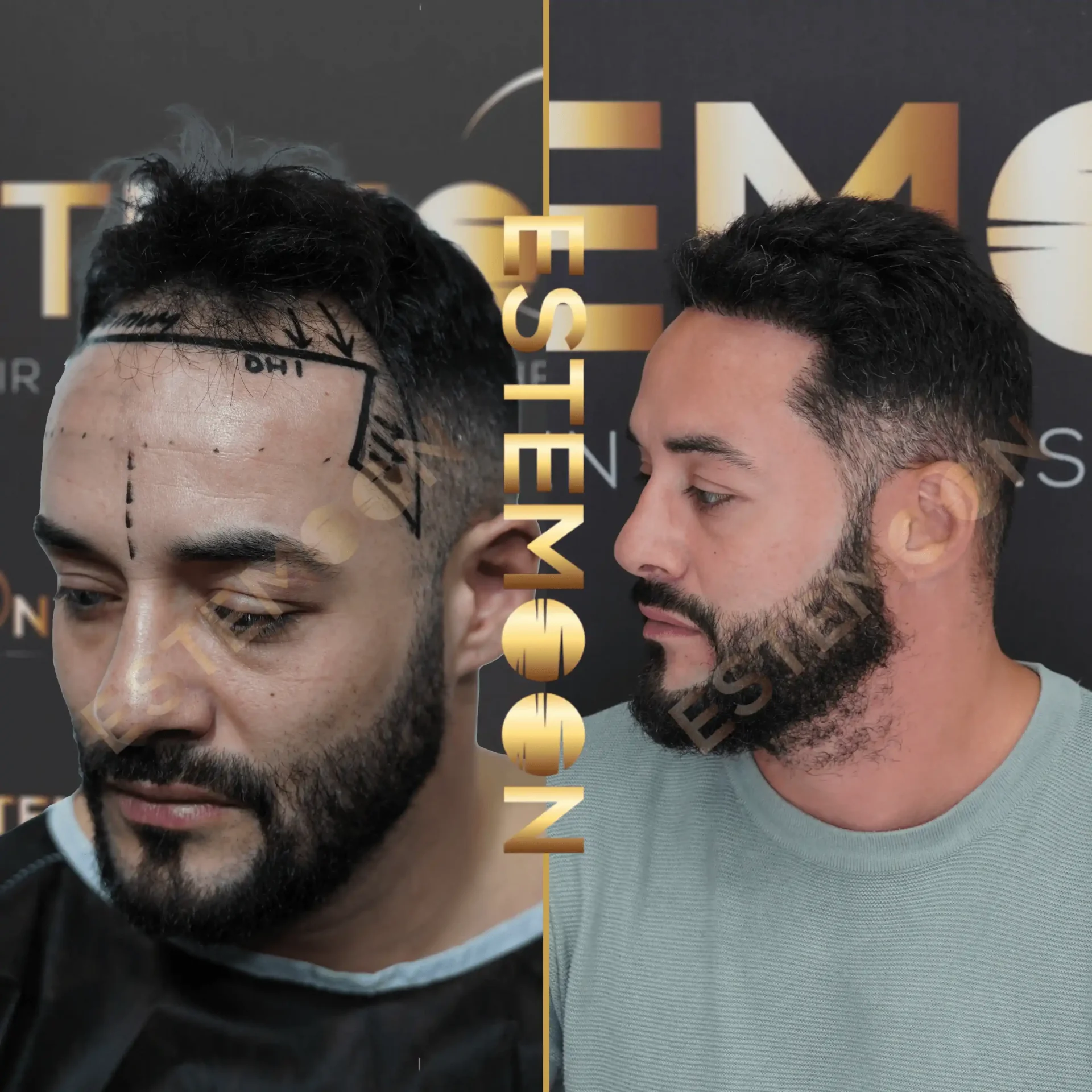
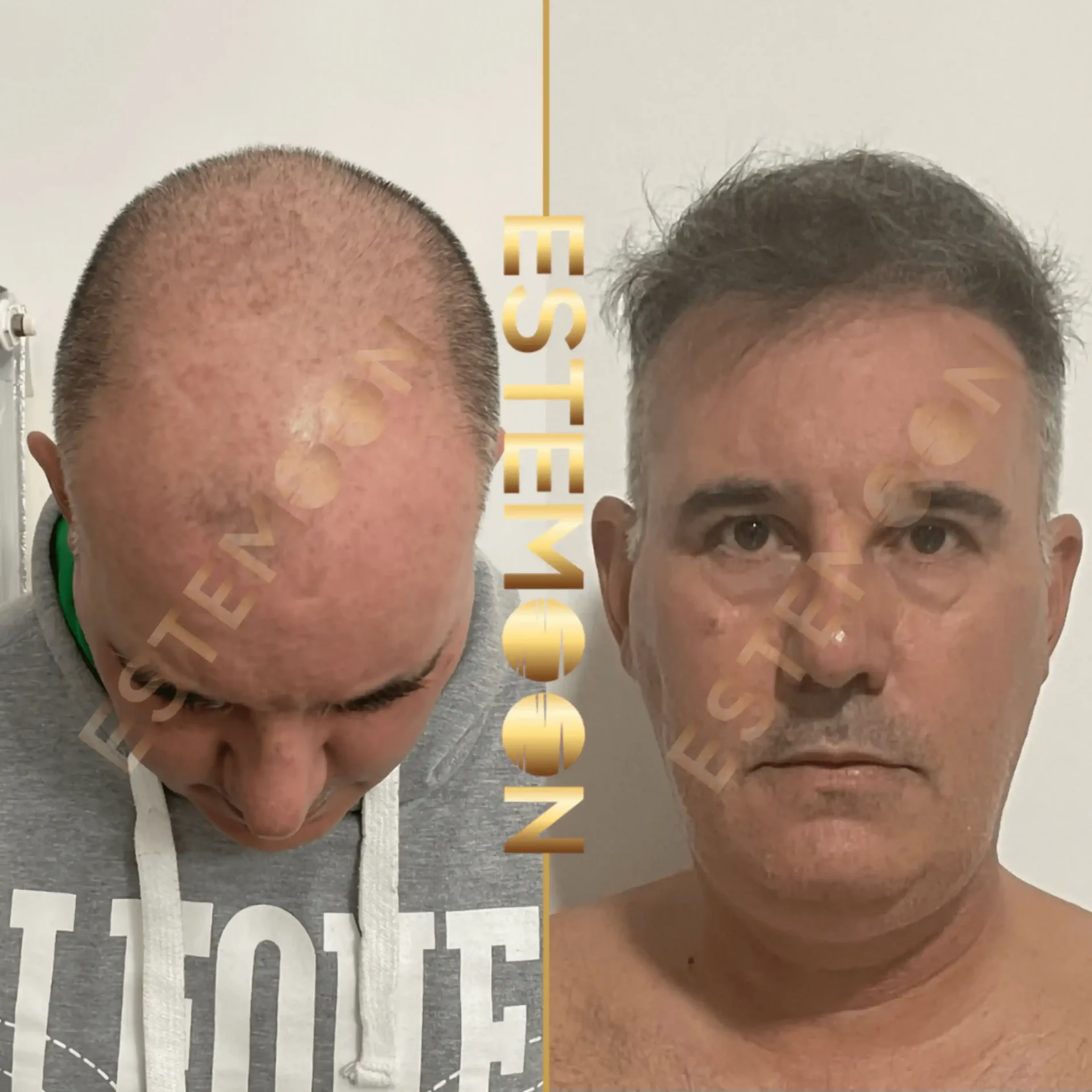

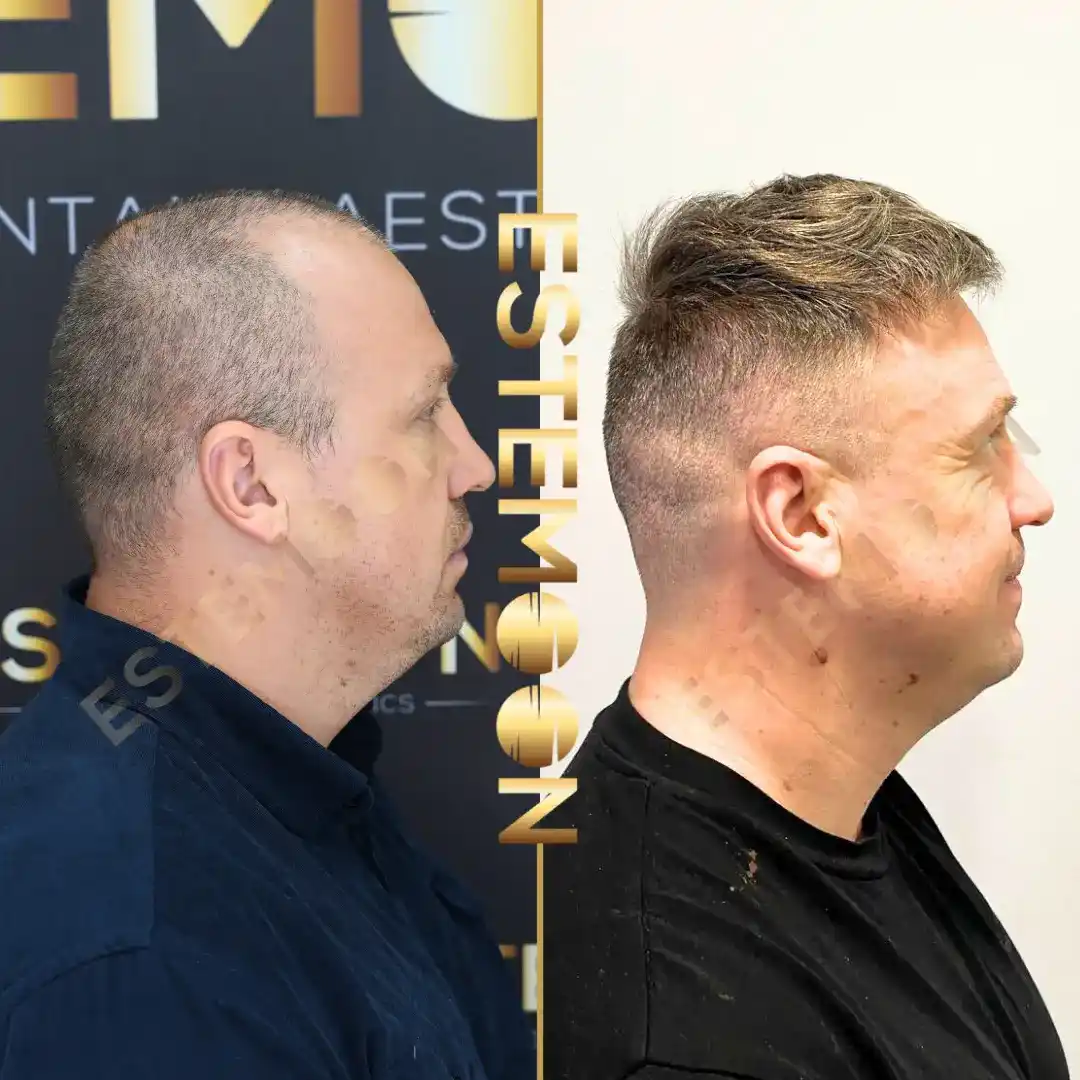
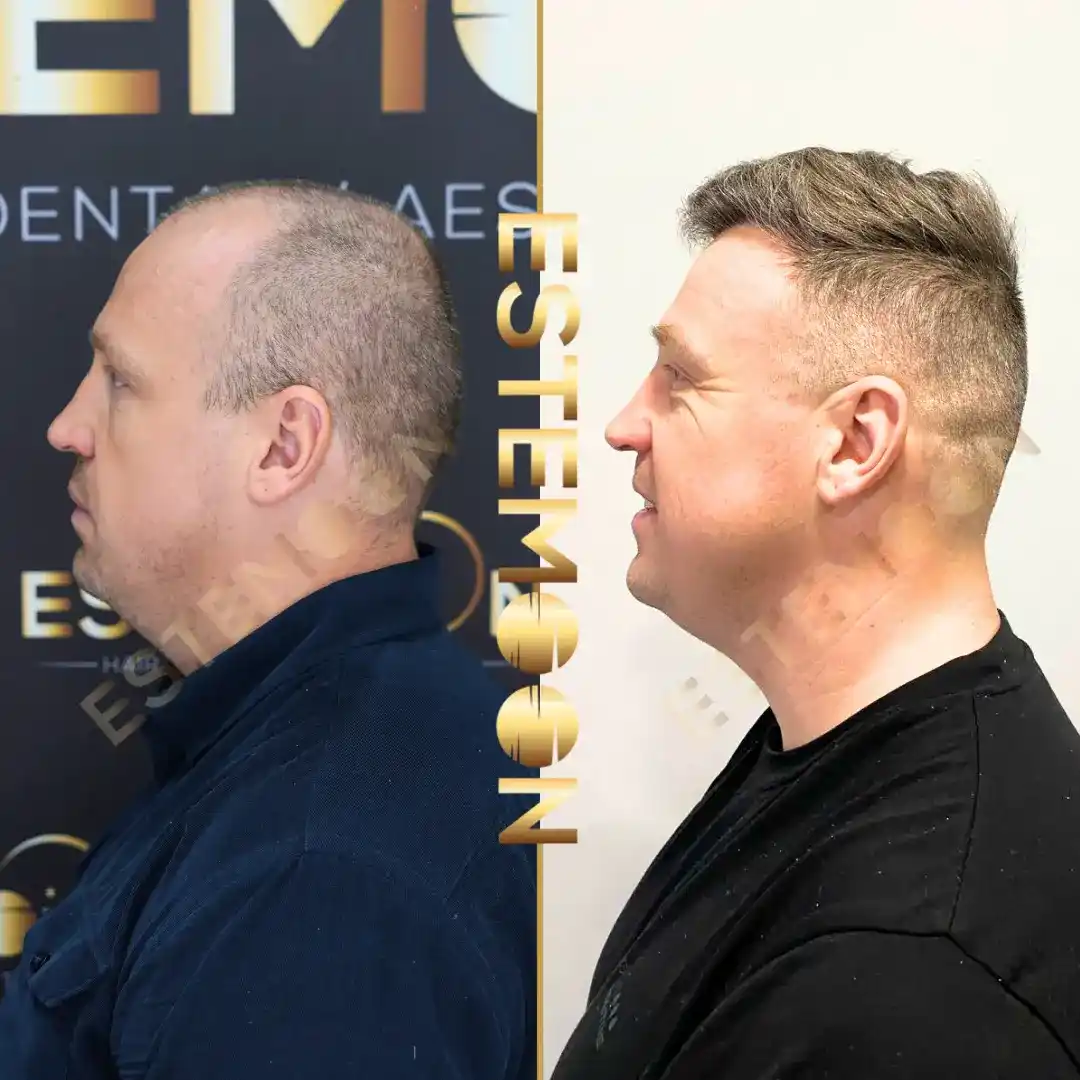
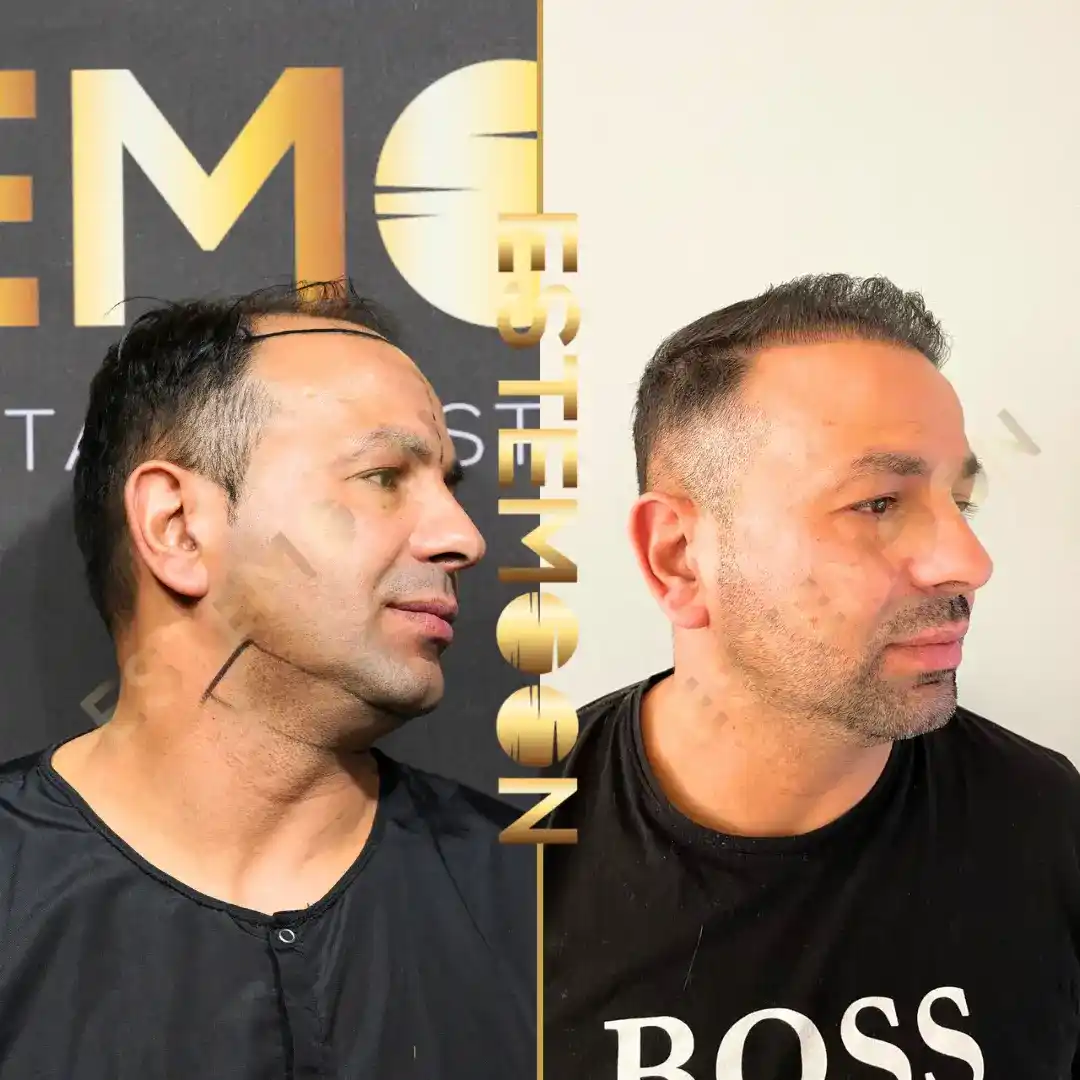

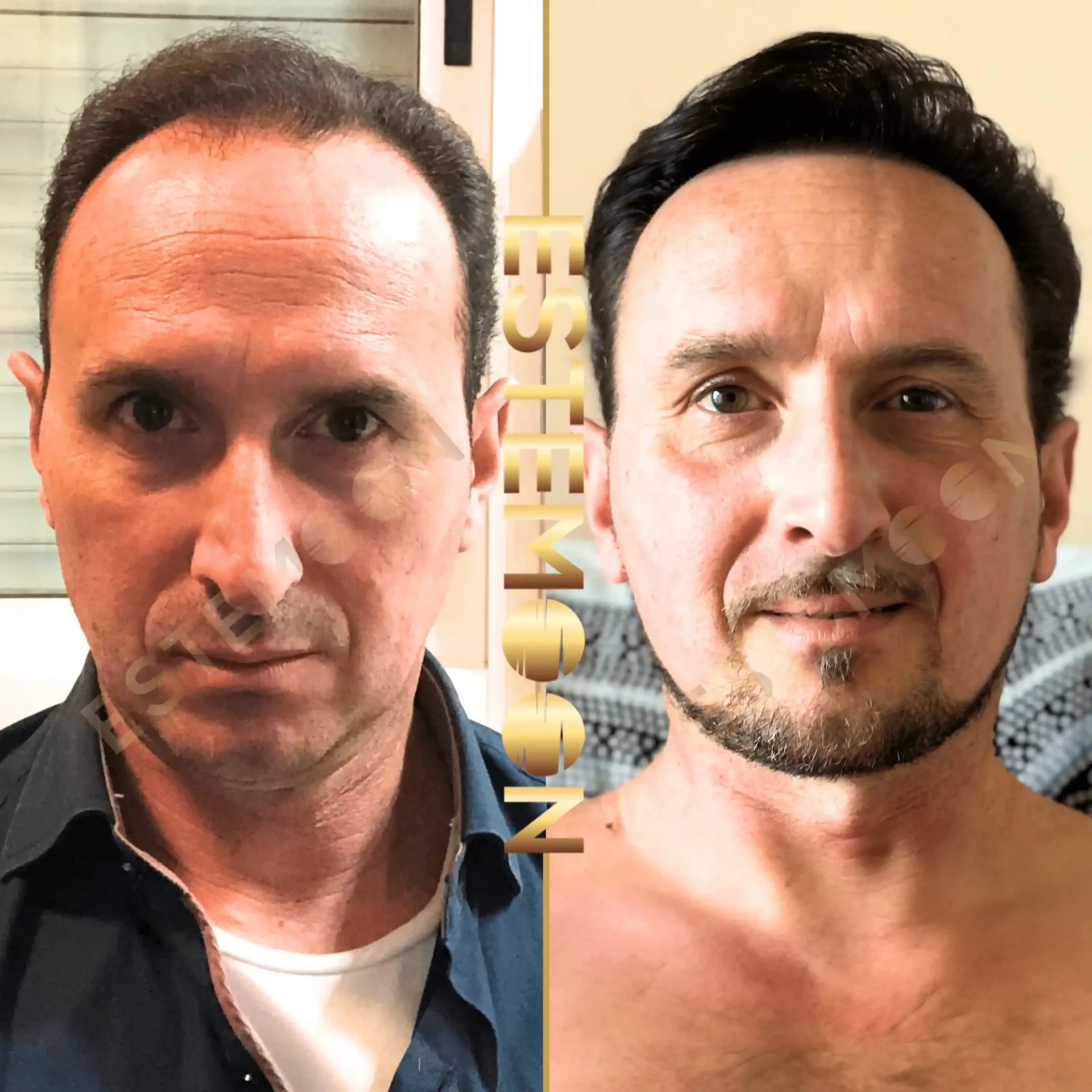


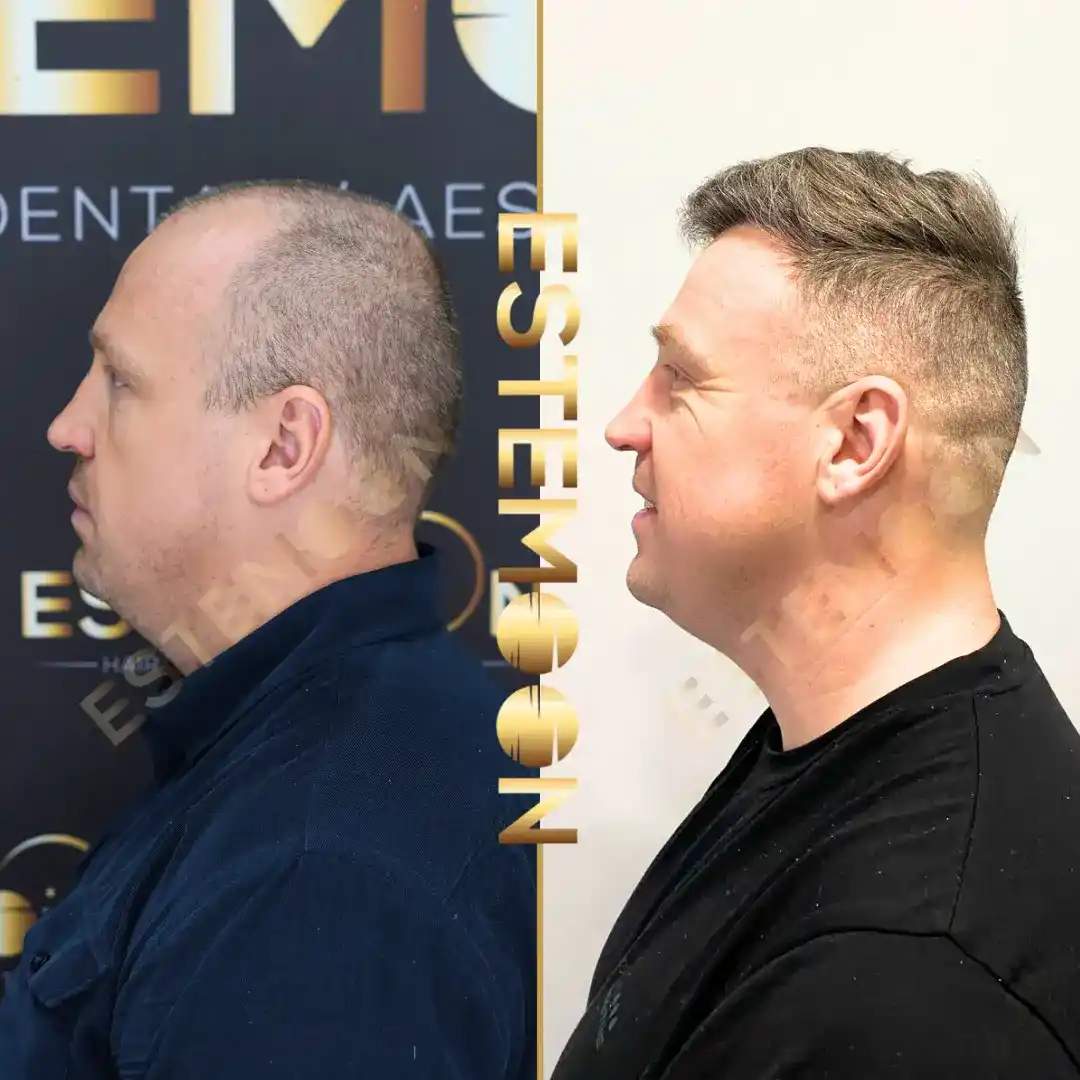
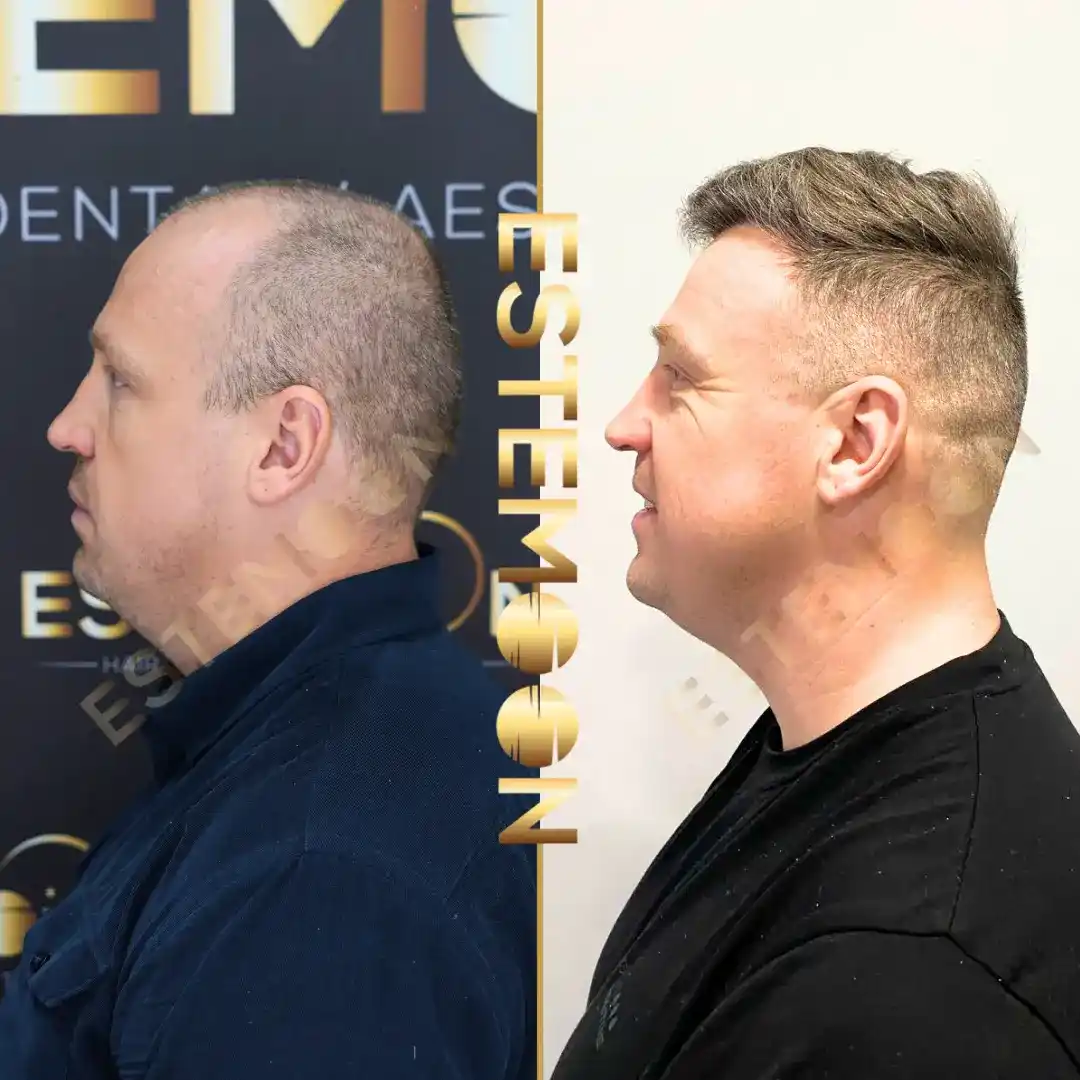
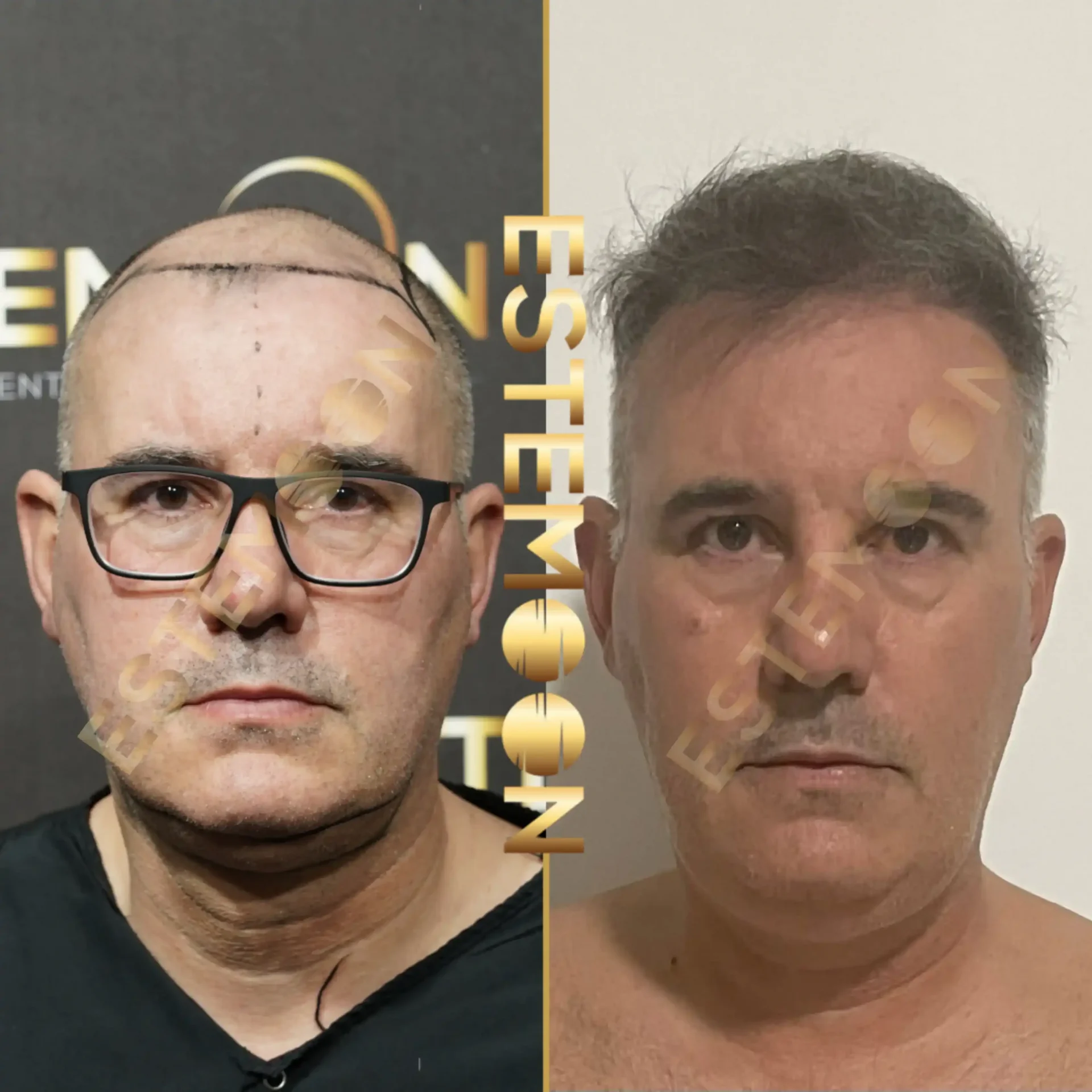


What to Expect During Your FUE Hair Transplant
Understanding the day of the procedure helps reduce anxiety and ensures a better experience.
The Surgical Environment
The procedure is done in a clean, sterile clinic environment with a dedicated team.
Aftercare Instructions
Patients receive detailed aftercare guidelines to aid healing and protect newly implanted grafts.
Am I a candidate for FUE hair transplant?
Not all patients are ideal candidates for FUE.
Suitability Factors
Good candidates have stable hair loss, healthy donor areas, and realistic expectations.
Conditions That May Prevent Eligibility
Patients with certain autoimmune disorders or severe scalp scarring may not qualify.
What is a FUE treatment like?
The FUE experience is typically smooth with manageable discomfort.
During the Procedure
Local anesthesia ensures comfort, and patients are usually relaxed during the operation.
Post-Treatment Sensations
Mild soreness and scabbing may occur but resolve within days.
When can I expect to see results?
Hair growth follows a predictable pattern after FUE.
Timeline of Growth
Hair begins to grow around the 3rd month, with full results visible by 12–18 months.
Initial Shedding Phase
Transplanted hair may fall out initially, which is a normal part of the cycle.
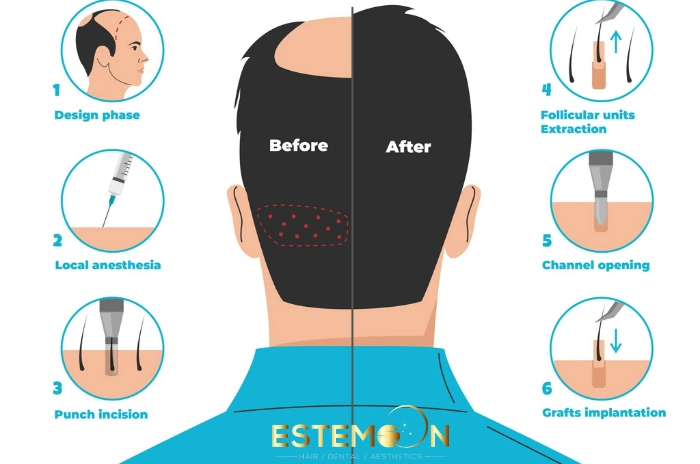
How long is recovery?
The FUE recovery is relatively fast compared to other surgical procedures.
Immediate Recovery
Most patients return to work within 3–5 days.
Full Healing
Complete healing of donor and recipient areas typically occurs within 2–3 weeks.
FUE – FUT Hair Transplants For Men & Women in Turkey
Both methods are available in Turkey, but FUE is more commonly preferred.
Gender-Specific Considerations
Men usually seek full hairline restoration, while women focus on density and natural blending.
Regional Expertise
Clinics in Istanbul and Antalya specialize in FUE with high international patient satisfaction.
Who Is Not a Good Candidate for Hair Restoration?
Some individuals may not benefit from FUE.
Common Disqualifying Factors
Poor donor area, active scalp infections, or unrealistic goals may affect eligibility.
Importance of Medical Consultation
A pre-operative evaluation is essential to ensure safety and success.
What are FUE Methods & Which FUE Technique is Best?
There are several FUE variations, each with unique benefits.
Popular Techniques
Standard FUE, Sapphire FUE, DHI, and Robotic FUE are widely practiced in Turkey.
Choosing the Right Method
Your surgeon will recommend the best method based on scalp analysis and desired results.
What Are the Ways to Implant Hair?
There are multiple implantation techniques to suit different needs.
Common Implantation Tools
Forceps, Choi implanter pens, and sapphire blades are used to insert grafts.
Impact on Outcome
The tool and method affect density, direction, and natural look of the transplanted hair.
How Many Hair Grafts Do I Need?
The number of grafts required depends on the extent of hair loss.
Estimating Graft Needs
A small recession might need 1,000–1,500 grafts, while full coverage could require over 4,000.
Customized Planning
Each treatment is tailored to the patient’s goals and anatomy.
How Follicular Unit Extraction Works
Follicular Unit Extraction (FUE) ensures long-term success by using DHT-resistant donor hair.
Biological Advantage
These transplanted follicles are genetically resistant to the hormone that causes balding.
Precision in Placement
Each graft is implanted at a calculated angle for maximum naturalness.
All-Inclusive Hair Transplant Package 📝


📌 Operation with FUE Sapphire / DHI technique (by the Doctor)
📌 2 Plasma/PRP injection
📌 Blood test (before surgery)
📌 Medications after surgery (stomach protector, painkillers, anti-swelling, antibiotics, cream)
📌 Special shampoo and lotion (special formula from the Istanbul Care laboratory).
📌 Medical neck pillow
📌 Medical check-up (after transplant)
📌 Hair washing (by our doctor after the operation)
📌 Lunch on the day of the operation
⚡️Accommodation: Hotel 2 nights (breakfast included)
⚡️VIP transport (Airport-Hospital-Hotel)
⚡️Guarantee Certificate 📑
⚡️Personal translator
⚡️Follow-up and support for 1 year
⚡️1 companion included
🌟 News 🌟: TREATMENT WITH STEM CELLS
🌟 News 🌟: RED LIGHT THERAPY
What is not included:
❇️ Plane ticket+
Key Benefits of FUE
The FUE offers a balance of aesthetics, minimal invasiveness, and long-term results.
Cosmetic Advantages
Scarring is minimal, and the hairline design is artistically crafted.
Medical Safety
Low complication rates make FUE a safe option for most patients.
What Happens During FUE?
A structured process ensures consistency and success.
Procedure Flow
It begins with preparation and anesthesia, followed by extraction, site creation, and implantation.
Patient Experience
You can relax, eat, and take breaks as needed during the day-long session.
How Long Before the New Hair Grows?
Hair regrowth is gradual but steady.
Growth Milestones
Noticeable change occurs around 6 months, with optimal density by month 12.
Final Appearance
By the end of the first year, most patients enjoy a fuller, natural look.
Neograft: Follicular Unit Extraction (FUE) Technique
Neograft improves FUE outcomes with semi-automated technology.
Pneumatic Extraction Explained
Neograft uses air pressure to extract follicles, preserving their integrity.
Technician Comfort
Reduced manual labor ensures consistent results even during long sessions.
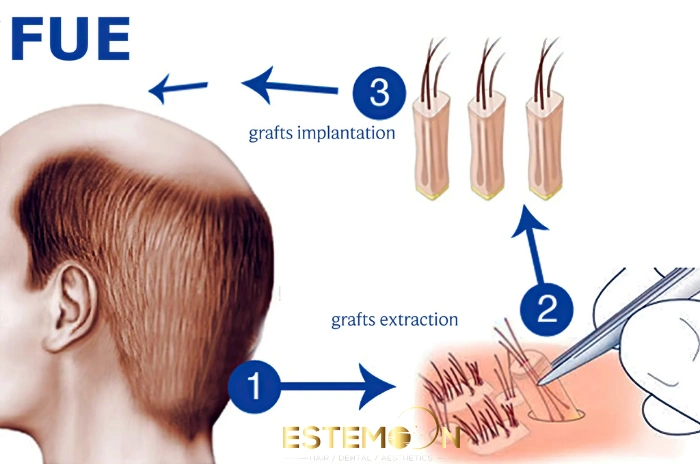
How Is Neograft Different From Other FUE Techniques?
Neograft stands out for its blend of manual precision and machine efficiency.
Automation and Accuracy
This technique ensures fewer damaged grafts and a quicker process.
Patient Preference
Many patients choose Neograft for its proven outcomes and shorter recovery.
Candidates for Neograft in Turkey
Turkey offers ideal conditions for those seeking Neograft treatment.
Ideal Profiles
Those with moderate hair loss, intact donor areas, and a desire for minimal scarring.
Availability of Clinics
Many Turkish clinics offer Neograft with multilingual services and patient coordinators.
Preparing for Neograft
Preparation ensures a smooth procedure and optimal outcome.
Health and Lifestyle
Patients are advised to stop smoking, stay hydrated, and avoid medications that affect clotting.
Pre-Surgical Instructions
Detailed instructions help minimize complications and speed up healing.
Results After Neograft Hair Restoration
Most patients are satisfied with the outcomes of Neograft.
Long-Term Appearance
Hair continues to grow naturally and requires no special maintenance.
Confidence and Lifestyle Impact
Patients report improved self-esteem and better personal presentation.
FUE Hair Transplant Cost in Turkey
Turkey offers world-class procedures at a fraction of Western prices.
Pricing Breakdown
Costs range from €1,500 to €2,500 depending on graft count, surgeon expertise, and package inclusions.
Inclusions and Value
Most packages include transport, accommodation, aftercare, and consultation, making it a convenient and affordable choice for international patients.
FAQs About FUE Hair Transplant in Turkey
What is FUE hair transplant?
FUE (Follicular Unit Extraction) is a modern hair restoration technique that extracts individual hair follicles for a minimally invasive and scar-free transplant.
Why choose Turkey for FUE hair transplant?
Turkey offers advanced technology, experienced surgeons, and all-inclusive hair transplant packages at competitive prices, attracting thousands of patients annually.
How much does a FUE hair transplant cost in Turkey?
The average cost ranges from €1,500 to €2,500, often including accommodation, transfers, and post-operative care.
How long does it take to see results from FUE?
Initial regrowth begins around 3–4 months, with visible improvements by 6 months and full results within 12–18 months.
Is FUE hair transplant painful?
The procedure is performed under local anesthesia, making it painless. Post-surgery discomfort is minimal and manageable.
What is the difference between FUE and Neograft?
Neograft is a semi-automated version of FUE that uses pneumatic pressure to extract follicles, offering faster procedures and high precision.
